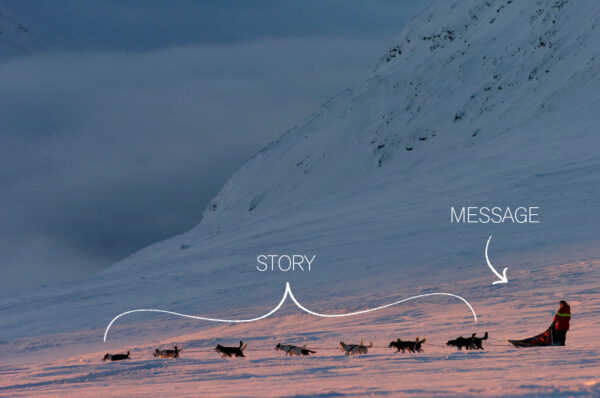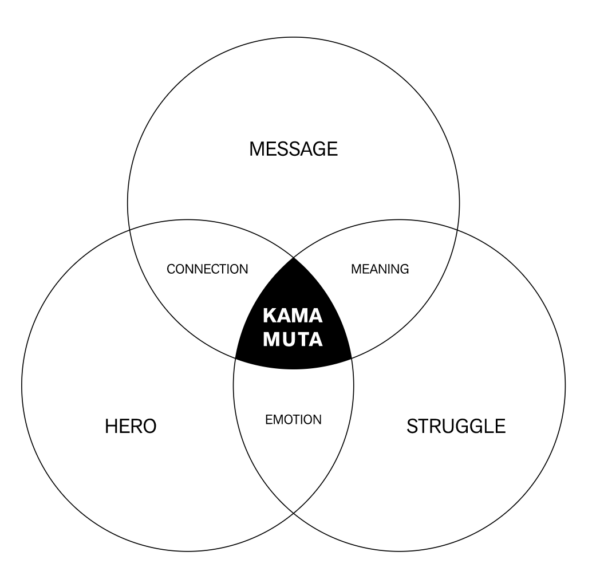WHY IS STORYTELLING SO IMPORTANT?
STORYTELLING IS ALL THE RAGE.
Everyone seems to agree: communication is at its most powerful and impactful when it’s told through stories. Research shows that messages are retained better, senders are deemed more relevant and sympathetic and audiences might even change their attitude and/or behaviors. But with all the communication professionals claiming to be reborn as storytellers, why are not all their messages in the vast ocean of self-proclaimed stories heard?
We’d like to make an emotional impact by truly telling our company’s story
“ | ANY CLIENT
TRUE VS. FALSE STORYTELLING
Of course, we can, but let’s first find out what type of story your company’s story currently is. Is it true storytelling? Then it’s about a protagonist who overcomes struggles to rise to a challenge that evokes positive transformation. Every storyteller has their own version of the classical principles of the craft, this is ours:
Or is it false or ‘faux’ storytelling? In that case it might distinctly resembles what you could consider bragging or promising.
Usually a company’s story starts of as bragging or promising, but that doesn’t mean that it’s untrue or even ‘a lie”, it just means that in order to achieve the great potential of storytelling, the story has to be told in a way that you could call “true storytelling.”
MESSAGE VS. STORYTELLING
But we actually do kind of want to brag a little bit about our company’s achievements, qualities, products, policies, footprint, our good intentions, etc. “So what do we do?” Not to worry, there will be plenty of room to ‘brag’ or promise. It’s just not part of the actual storytelling. In fact, it helps to view your film as consisting of two parts: the story and the message. These two relate to each other like this:

The story is the vehicle that delivers the message.
In order for people to be susceptible to your message, to find it relevant, worthwile and even inspiring, THEY MUST CARE ABOUT YOU and about your world first.
Making your audience pay attention and care is by far the hardest task your communication has to face, because audiences are constantly begged for their attention and are flooded with content. This is where storytelling comes in.
We are all wired to be hooked by great storytelling, so it’s an effective vehicle to deliver your message. However, good storytelling requires some room and needs to be pure and uncluttered by your message (which is, quite inevitably “bragging and promising”). So our advice is always: reserve the first 90% (the more the better) of your film for storytelling and leave the actual message for the last 10%. That might sound counterintuitive, but rest assured: once the story has touched your audience’s heart, their mind will open and you can pour your message right in.
KAMA MUTA
So why do we care so much about storytelling at 1Camera? Well, the obvious answer is that the better our storytelling is, the better our films and the happier our clients are. But as much as we love to have satisfied clients, that’s in all honesty not enough of a driving force for which you can wake us up in the middle of the night. You can wake us up in the middle of the night for storytelling and that has everything to do with the effect storytelling has.
Usually this effect is labeled “emotional impact”, but there is a more specific emotion that makes us tick: Kama Muta. Kama Muta is an emotion that does not have a word in any modern language, but it is studied extensively by anthropologists* and has existed throughout times and tribes around the world: it’s the connecting emotion. Kama Muta is a feeling that manifests itself physically, in ways we all know and recognize:
It’s the feeling you have when feeling goosebumps, a lump in your throat, warm feeling in your chest, tears in your eyes.
The feeling you get when you experience true storytelling.
And the best thing of all, Kama Muta makes us feel connected to other humans and therefore compels us to share, whatever gave us the feeling in the first place. The way we see it at 1Camera, we have the opportunity to make people feel connected by providing them with great storytelling: that’s something you can wake us up for in the middle of the night!
